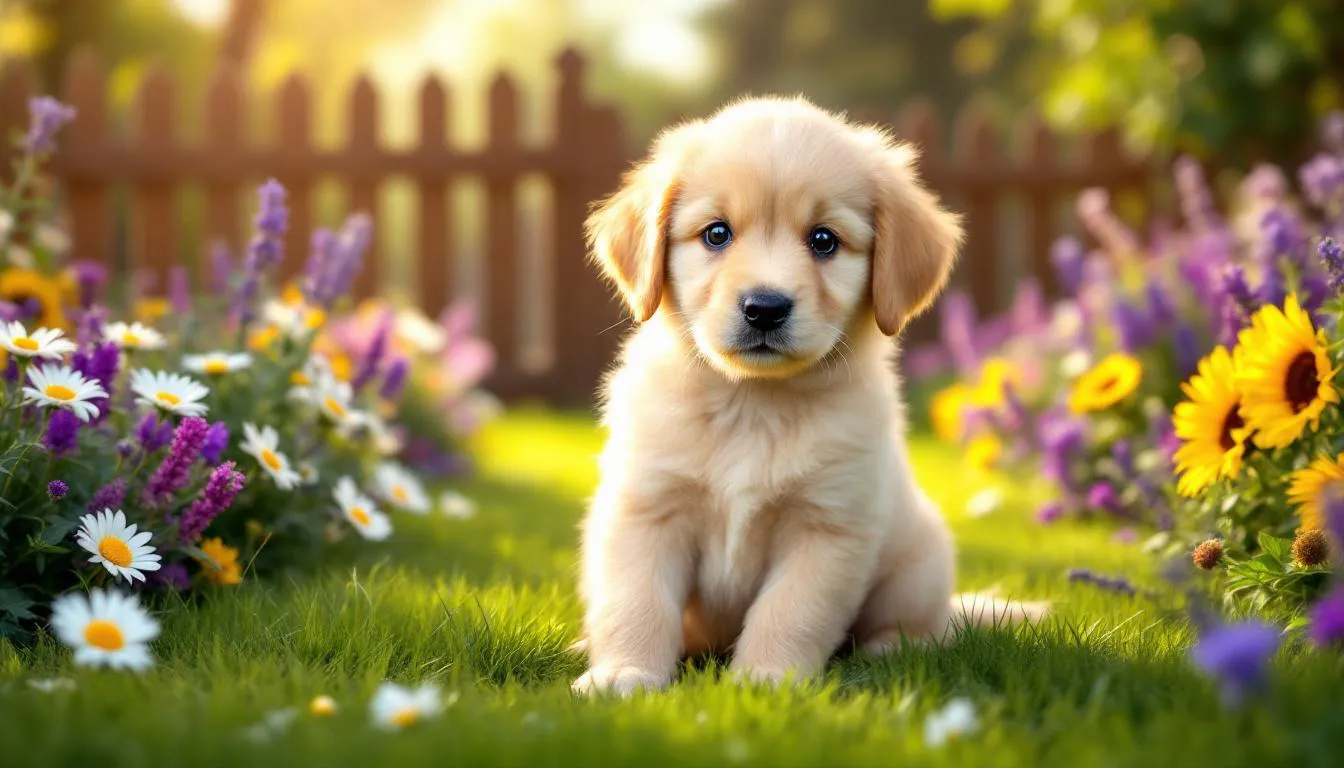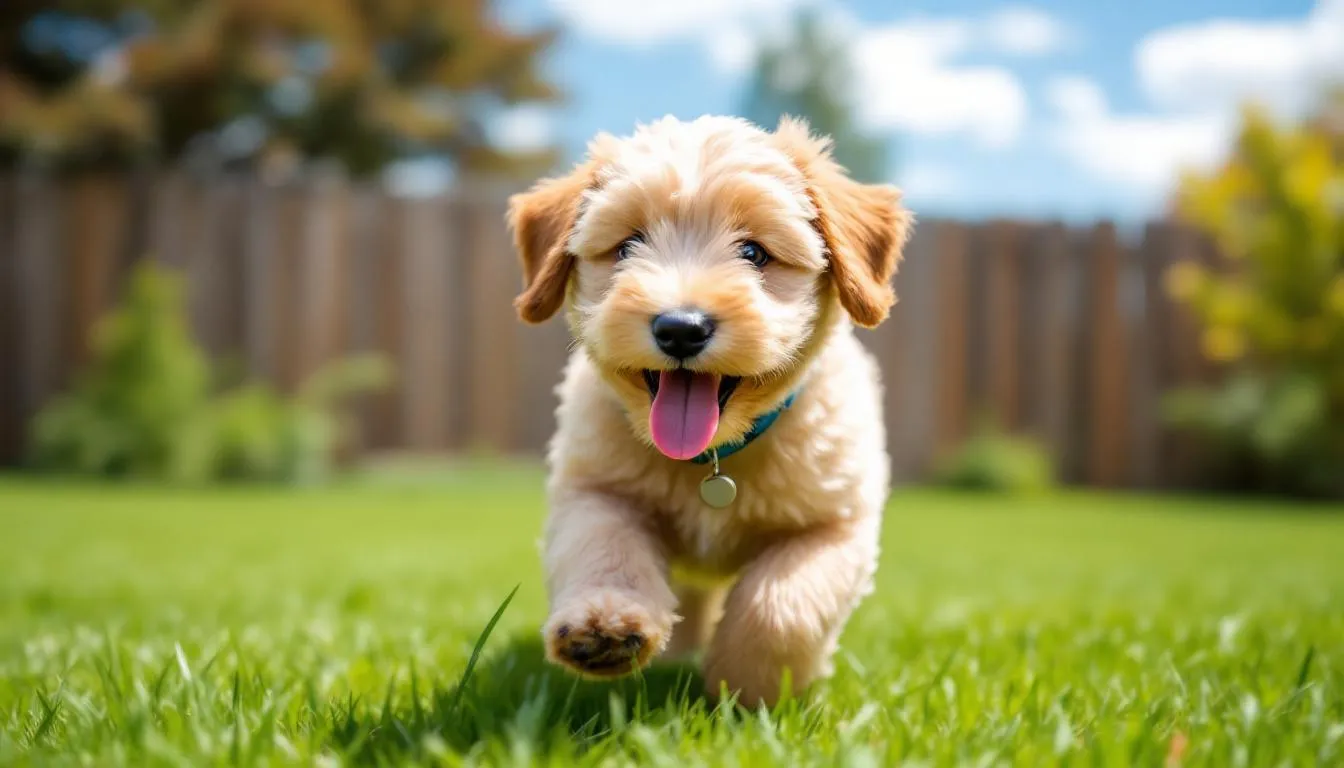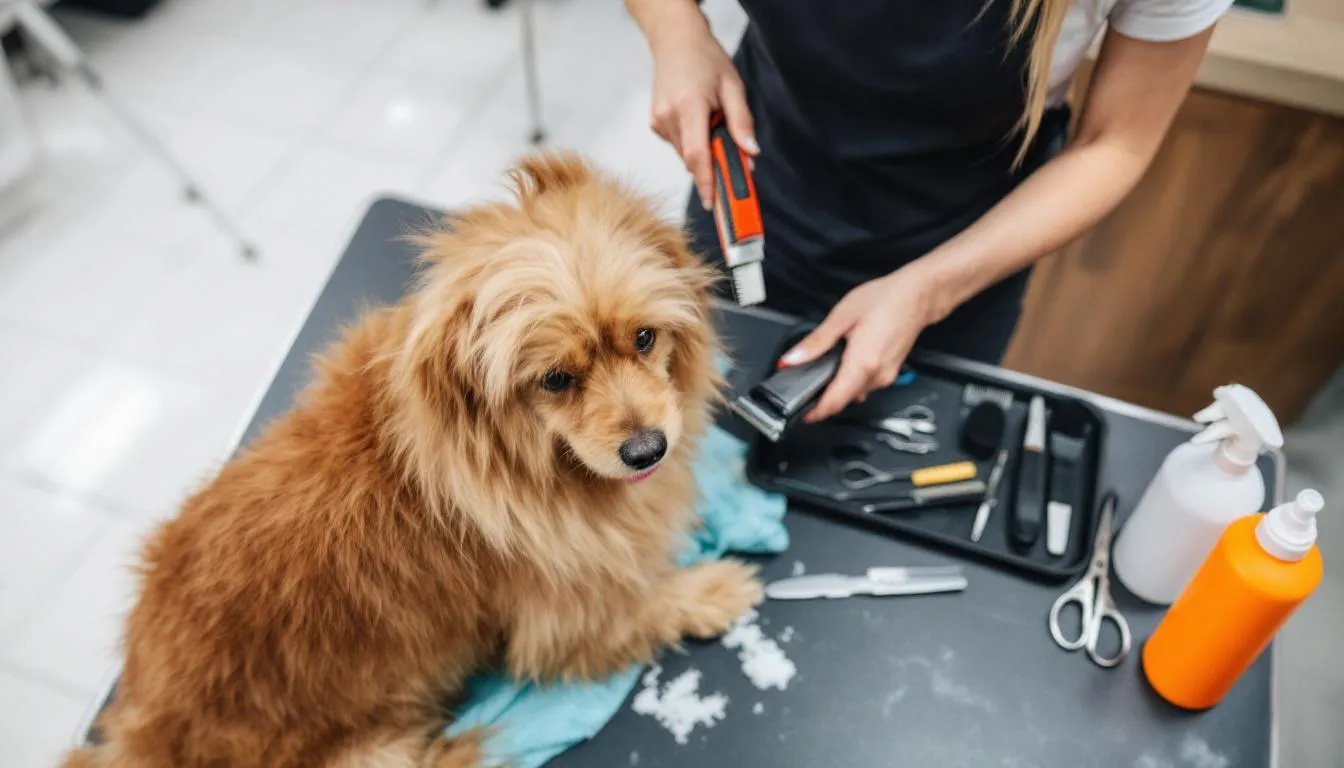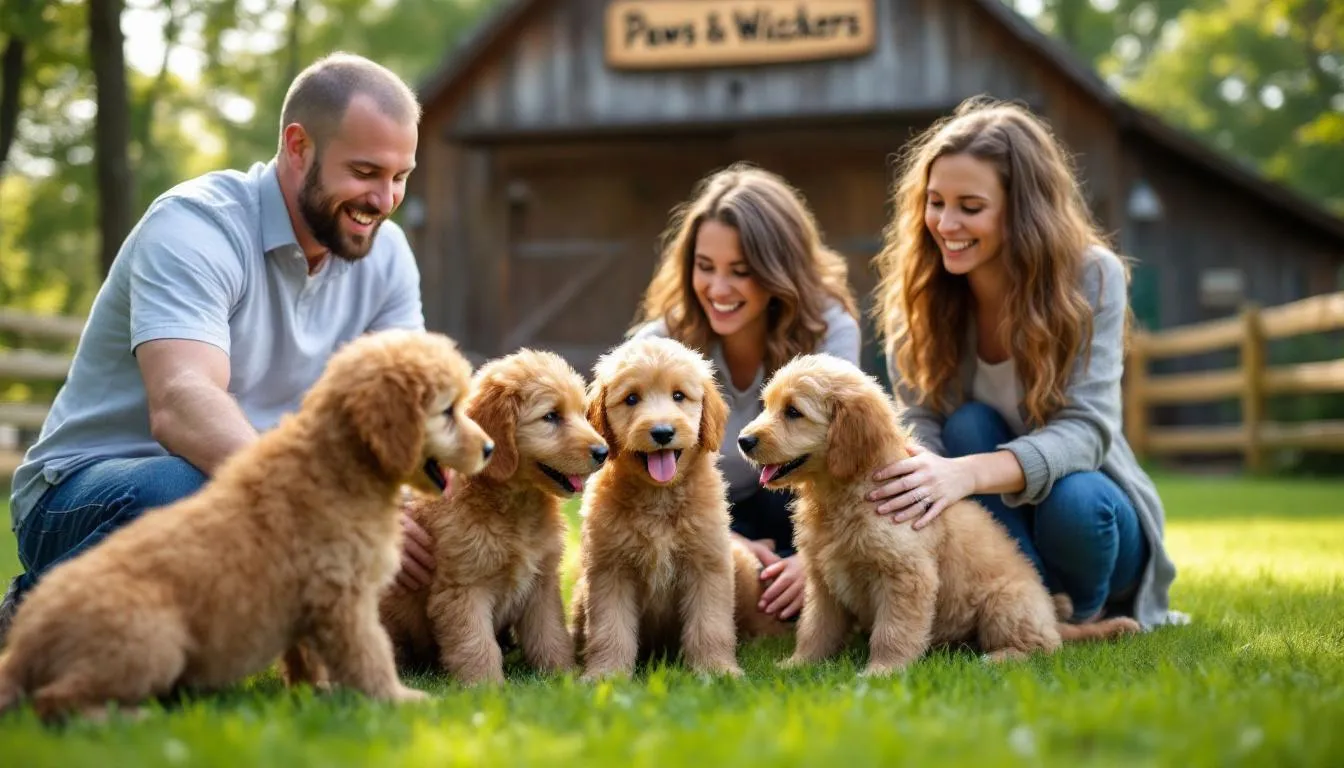

Key Takeaways
Mini goldendoodles are a crossbreed between golden retrievers and miniature poodles, typically weighing 15-40 pounds and standing 13-20 inches tall
- Mini goldendoodles are a crossbreed between golden retrievers and miniature poodles, typically weighing 15-40 pounds and standing 13-20 inches tall
- These puppies are known for their hypoallergenic, low shedding coats and friendly, intelligent temperament making them ideal family pets
- They require daily exercise, mental stimulation, and regular grooming every 6-8 weeks to maintain their coat and overall health
- Mini goldendoodle puppies typically cost between $1,500-$3,000 from reputable breeders who provide health guarantees and genetic testing
- With proper care and training, these puppies have a lifespan of 10-15 years and adapt well to various living situations including apartments
These puppies are known for their hypoallergenic, low shedding coats and friendly, intelligent temperament making them ideal family pets
They require daily exercise, mental stimulation, and regular grooming every 6-8 weeks to maintain their coat and overall health
Mini goldendoodle puppies typically cost between $1,500-$3,000 from reputable breeders who provide health guarantees and genetic testing
With proper care and training, these puppies have a lifespan of 10-15 years and adapt well to various living situations including apartments
The perfect blend of golden retriever sweetness and poodle intelligence comes in a compact, cuddly package that’s hard to resist. Mini goldendoodle puppies have captured hearts across the country with their teddy bear-like appearance and loving personalities. These adorable companions offer families the best of both worlds: the friendly, loyal nature of golden retrievers combined with the low shedding, hypoallergenic coat of poodles.
Whether you’re a first-time dog owner or adding to your pack, understanding what makes these puppies special will help you provide the best possible care. From their playful personalities to their grooming needs, mini goldendoodles bring joy and companionship to families of all sizes. Let’s explore everything you need to know about these wonderful pets.
What Are Mini Goldendoodle Puppies?
Mini goldendoodles represent a carefully planned crossbreed between golden retrievers and miniature poodles. This designer breed was developed to create the perfect puppy for families seeking a smaller, more manageable companion that maintains the beloved traits of both parent breeds. These dogs typically reach 13-20 inches tall and weigh between 15-40 pounds when fully grown, making them an ideal size for apartment living and smaller homes.
The breed’s development focuses on combining the golden retriever’s renowned friendliness and loyalty with the poodle’s intelligence and non shedding coat characteristics. Breeders who follow responsible breeding practices carefully select parent dogs to ensure healthy, well socialized puppies that embody the best qualities of both breeds.
Understanding generational differences is crucial when choosing your new puppy. F1 mini goldendoodles are first-generation crosses (50% golden retriever, 50% miniature poodle), while F1B puppies are 75% poodle and 25% golden retriever, typically resulting in curlier, more hypoallergenic coats. F2 generation represents second-generation crosses between two F1 parents.
The breed goes by several alternative names including miniature groodles, mini groodles, and teddy bear goldendoodles. Regardless of the name, these sweet companions have become increasingly popular among families seeking a loving, intelligent pet that fits well into modern life.
Prospective owners should be aware of the mini goldendoodle's unique health, training, and environmental needs before making a decision.
Origin and Heritage (Thanks Golden Retrievers!)
Mini goldendoodles are a delightful blend of two beloved breeds: the golden retriever and the miniature poodle. This unique crossbreed first gained popularity in the 1990s, quickly becoming a favorite among families seeking a loving, playful, and low shedding companion. The mini goldendoodle inherits the best traits from both parent breeds—intelligence and loyalty from the poodle, and friendliness and affection from the golden retriever—making them the perfect addition to any family.
Our commitment to responsible breeding practices ensures that every puppy is well socialized from the very beginning. By carefully selecting parent dogs with outstanding temperaments and health, we provide families with puppies that are not only adorable but also healthy and ready to adapt to their new homes. Mini goldendoodles are known for their loving nature, playful spirit, and low shedding coats, making them an ideal breed for those looking for a friendly, family-oriented pet. Whether you’re looking for a companion to join in on family adventures or a cuddly friend to brighten your days, a mini goldendoodle is the perfect choice.


Physical Characteristics and Appearance
The most striking feature of mini goldendoodle puppies is their incredibly soft, fluffy coat that develops into one of three main textures as they mature. Wavy coats offer a beautiful balance between the parent breeds, while curly coats lean more toward the poodle heritage and provide maximum hypoallergenic benefits. Straight coats, though less common, tend to shed slightly more but still maintain the breed’s generally low shedding properties.
Color variations in these puppies are truly spectacular, ranging from classic cream and gold shades inherited from golden retrievers to rich chocolate, black, and even parti-colored patterns from their poodle genetics. Red and apricot puppies are particularly sought after for their stunning appearance, while silver and grey variations offer unique beauty that compliments any family setting.
The hypoallergenic qualities that make these puppies so appealing come primarily from their poodle heritage. While no dog is completely hypoallergenic, mini goldendoodles produce significantly less dander than many other breeds, making them suitable companions for most people with mild allergies. Their low shedding nature also means less hair around your home and on your furniture.
These puppies maintain their teddy bear-like facial features throughout their lives, with expressive eyes and soft, rounded features that make them irresistibly cute. Their compact body structure develops gradually, with most puppies reaching their adult size between 12-18 months of age. The growth timeline allows families to watch their perfect puppy transform into a beautiful adult companion.
Size and Type
Mini goldendoodles come in a range of sizes to suit every family’s needs. Typically, these playful dogs stand between 13 and 20 inches tall at the shoulder and weigh anywhere from 15 to 40 pounds when fully grown. The size of your puppy will often reflect the size of its parents, so you can have a good idea of what to expect as your new companion grows.
We specialize in breeding both F1 and F1B mini goldendoodles, each offering unique benefits. F1 mini goldendoodles are a first-generation cross, while F1B puppies have a higher percentage of poodle, resulting in even lower shedding and more hypoallergenic coats. This makes our puppies a perfect match for families with allergies or those who prefer a low-maintenance, low shedding dog. Whether you’re searching for a smaller companion for apartment living or a slightly larger dog for an active household, we can help you pick the perfect puppy to fit your lifestyle and bring joy to your family.
Temperament and Personality Traits
Mini goldendoodle puppies are naturally friendly, affectionate, and social creatures that thrive on human companionship. Their high intelligence, inherited from both parent breeds, makes them eager to please and quick to learn, traits that serve them well throughout their life. These playful dogs balance energy and enthusiasm with calm, cuddly moments that bring immense joy to their families.
The breed’s compatibility with children is exceptional, as they tend to be patient and gentle even during their puppy months. When properly socialized, they adapt well to other pets and welcome strangers with friendly curiosity rather than suspicion or fear. This social nature makes them excellent therapy and emotional support animals for those who need extra companionship. There is no need to worry about the breed's adaptability and compatibility with families, as these dogs are known for their gentle and friendly nature.
However, their strong attachment to family can lead to separation anxiety if left alone for extended periods. These loyal companions prefer to be where their people are, whether that’s helping with daily tasks or simply sitting nearby while you work. Early training and gradual independence building help manage this tendency and ensure your puppy grows into a well-balanced adult.
Their playful personality shines through in everything they do, from learning new tricks to exploring the backyard. Yet they’re equally content cuddling on the couch after a day of adventures, providing the perfect balance of activity and calm that fits well with family life.
Family-Friendly Qualities
Mini goldendoodles are celebrated for their exceptional family-friendly qualities, making them an ideal breed for households with children. These puppies are naturally loyal, gentle, and patient, traits that help them form strong bonds with every member of the family. Our puppies are well socialized from an early age, ensuring they adapt quickly to new environments, people, and other pets.
With their loving and friendly personalities, mini goldendoodles thrive on attention and enjoy being involved in all aspects of family life. They are quick to learn, eager to please, and respond well to positive reinforcement, making them a great match for families looking for a loyal and adaptable companion. Whether it’s playtime in the backyard or cuddling on the couch, these dogs bring love and happiness to every home. With proper care and early training, your mini goldendoodle will become a cherished addition to your family, providing years of joy and companionship.


Training and Socialization
Starting training early with your mini goldendoodle puppy, ideally between 8-16 weeks, sets the foundation for a lifetime of good behavior and strong communication. Their sensitive nature responds best to positive reinforcement methods, where praise, treats, and play reward desired behaviors. Harsh corrections or punishment can damage their trust and slow the learning process.
Puppy socialization classes offer invaluable opportunities for your new puppy to meet other dogs and people in a controlled environment. These experiences help build confidence and teach appropriate social skills that will serve them throughout their life. Well socialized puppies grow into adults who can adapt to new situations with ease and grace.
House training typically progresses smoothly with consistency and patience. Most mini goldendoodle puppies can learn basic potty training within a few months, though individual progress varies. Set a regular schedule for meals, potty breaks, and sleep to help establish the routine that supports successful house training.
Mental stimulation through puzzle toys, interactive games, and training sessions keeps these intelligent puppies engaged and prevents destructive behaviors. Teaching basic commands like sit, stay, and come provides the foundation for more advanced training while building the communication skills that make daily life easier for both puppy and family.
Health Considerations for Upcoming Litters
Understanding potential health issues helps you choose a healthy puppy and provide the best care throughout their life. Common concerns in mini goldendoodles include hip and elbow dysplasia, luxating patella, eye problems like progressive retinal atrophy, and hypothyroidism. However, the hybrid vigor from crossbreeding often reduces the risk of certain genetic conditions compared to purebred dogs.
Choosing breeders who conduct comprehensive genetic health testing on parent dogs significantly reduces the likelihood of hereditary health problems. Responsible breeders provide health certificates and guarantee the puppies they offer for sale, giving you confidence in your investment and peace of mind about your puppy’s future health.
Regular veterinary checkups starting with your puppy’s first visit help establish baseline health and ensure proper vaccination schedules. Your veterinarian will provide guidance on parasite prevention, spaying or neutering, and other preventive care measures that protect your puppy’s health and development.
With proper care, mini goldendoodles typically enjoy a lifespan of 10-15 years. Maintaining a healthy weight, providing regular exercise, and staying current on preventive care contribute to a longer, happier life for your companion. Early detection and treatment of health issues often lead to better outcomes and help ensure many years of joy together.


Care and Grooming Requirements
Daily brushing prevents matting and keeps your mini goldendoodle’s coat healthy and beautiful. Their curly or wavy hair can quickly develop tangles, especially behind the ears, under the legs, and around the collar area. A good slicker brush and metal comb form the foundation of your grooming toolkit, making daily care manageable and effective.
Professional grooming every 6-8 weeks maintains the coat’s shape and health while allowing for nail trimming and ear cleaning by experienced hands. Between professional visits, weekly ear cleaning and nail trimming 1-2 times monthly help prevent infections and keep your puppy comfortable. Some families choose to learn basic grooming skills to manage routine care at home.
Daily dental care prevents periodontal disease and maintains overall health. Starting dental care routines early helps your puppy accept tooth brushing and dental treats as normal parts of their care routine. Good dental health contributes to overall well-being and prevents costly dental problems later in life.
Bathing frequency depends on your puppy’s activity level and coat type, but most mini goldendoodles need baths every 4-6 weeks or when they get particularly dirty. Using high-quality, dog-specific shampoos protects their skin and coat while maintaining the natural oils that keep their fur healthy and soft.
Exercise and Activity Needs
Mini goldendoodle puppies need 30-60 minutes of daily exercise to stay physically and mentally healthy. This playful dog thrives on variety, enjoying walks, fetch games, swimming, and even agility training as they mature. Breaking exercise into multiple sessions throughout the day often works better than one long session, especially for young puppies whose attention spans are still developing.
Their adaptability to apartment living makes them great pets for urban families, provided they receive adequate exercise and mental stimulation. A securely fenced yard offers wonderful opportunities for safe, off-leash play, but regular walks and interactive games can meet their needs even without a yard.
Mental stimulation is just as important as physical exercise for these intelligent companions. Training sessions, puzzle toys, and interactive games challenge their minds and prevent boredom-related behaviors. These activities also strengthen the bond between you and your puppy while building communication skills.
Weather sensitivity requires some planning for extreme temperatures. Their coat provides good insulation, but very hot or cold weather may require adjusted exercise schedules or indoor alternatives. Teaching indoor games and activities ensures your puppy stays active regardless of weather conditions.
Cost and Investment
Bringing home a mini goldendoodle is an investment in years of happiness, love, and companionship. The cost of a mini goldendoodle puppy can vary based on factors such as size, coat type, and lineage, but we strive to offer competitive pricing that reflects the quality and care we put into every puppy. Each new puppy comes with a health guarantee, giving you peace of mind that your companion is starting life on the right paw.
Your investment covers more than just the puppy itself—it includes essential health measures like vaccinations, microchipping, and spaying or neutering. We also provide ongoing support and guidance to help you care for your puppy as they grow. With proper care, your mini goldendoodle can enjoy a happy, healthy life of 10-15 years or more. Choosing a well-bred puppy means you’re not only welcoming a new friend into your home, but also ensuring a lifetime of joyful memories together.


Finding Reputable Breeders
Identifying responsible breeding practices protects you from puppy mills and ensures you receive a healthy, well-adjusted puppy. Red flags include breeders who won’t let you visit their facility, have multiple litters available at once, or can’t provide health testing documentation for parent dogs. Legitimate breeders welcome questions and provide extensive information about their breeding program.
When evaluating breeders, ask about health guarantees, genetic testing results, and the socialization process for their puppies. Meeting the parent dogs, especially the mother, gives insight into your puppy’s potential temperament and size. Reputable breeders often have waiting lists for upcoming litters and require deposits to secure your place.
Expect to invest between $1,500-$3,000 for a mini goldendoodle puppy from a quality breeder, with prices varying based on location, breeder reputation, and specific lineage. While this may seem expensive, the investment in health testing, proper care, and early socialization saves money and heartache in the long run.
The reservation process often involves applications, interviews, and deposits well before puppies are born. Submitting an application or inquiry through the breeder's site is usually the first step, allowing you to express your interest and begin communication. This thorough process allows breeders to match puppies with appropriate families and ensures each puppy goes to a home prepared to provide proper care and love throughout their life.
Preparing for Your Mini Goldendoodle Puppy
Essential supplies for your new puppy include a properly sized crate, comfortable bedding, food and water bowls, appropriate toys, and basic grooming tools. Setting up these items before bringing your puppy home helps create a smooth transition and shows your puppy where they belong in your family structure.
Puppy-proofing your home protects both your belongings and your curious new family member. Securing electrical cords, removing small objects that could be swallowed, and blocking access to dangerous areas prevents accidents and gives your puppy safe spaces to explore and learn.
Establishing feeding schedules with high-quality puppy food supports healthy growth and development. Your breeder should provide information about the food your puppy has been eating, allowing you to maintain consistency or gradually transition to your preferred brand. Regular meal times also support house training efforts.
Scheduling your puppy’s first veterinary appointment within a few days of bringing them home ensures they’re healthy and establishes the vaccination schedule that protects them from disease. Your veterinarian can also provide guidance on spaying or neutering, parasite prevention, and other health considerations specific to your puppy.
Setting up training routines and house rules from day one helps your puppy understand expectations and builds the foundation for good behavior. Consistency in rules and routines makes the adjustment period easier for everyone and helps your puppy quickly become a well-integrated family member.
If you have any questions or need more information about preparing for your mini Goldendoodle puppy, feel free to contact us. We’re always available to talk or text, and we’re happy to help you with any concerns or support you may need.
Testimonials and Reviews
Our families consistently share how their mini goldendoodles have brought joy, love, and companionship into their lives. One happy customer shared, “Our mini goldendoodle is the perfect addition to our family—she’s loving, loyal, and always ready for fun.” Another family praised our responsible breeding practices, saying, “We were so impressed by the care and attention given to the puppies. It was clear they were well socialized and loved from day one.”
We take pride in providing healthy, well-adjusted puppies that quickly become cherished members of their new families. Our commitment to responsible breeding practices and ongoing support has earned us glowing reviews from families who appreciate the loyalty, playfulness, and loving nature of their mini goldendoodles. Whether you’re looking for your first dog or adding to your pack, our puppies are sure to exceed your expectations and bring happiness to your home for years to come.
FAQ
Are mini goldendoodles good for first-time dog owners?
Yes, their intelligent and eager-to-please nature makes them excellent choices for beginners, especially with proper training and socialization. Their moderate size and adaptable temperament make them easier to manage than larger breeds, while their responsiveness to positive training methods helps new owners build confidence in their dog handling skills.
How much do mini goldendoodle puppies shed?
They are considered low to non shedding due to their poodle genetics, making them suitable for people with allergies, though individual puppies may vary. The amount of shedding depends largely on which coat type they inherit, with curlier coats typically shedding less than straighter ones.
What’s the difference between F1 and F1B mini goldendoodles?
F1 puppies are 50% golden retriever and 50% poodle, while F1B are 25% golden retriever and 75% poodle, typically resulting in curlier, more hypoallergenic coats. F1B puppies tend to have more predictable coat characteristics and are often preferred by families with stronger allergy concerns.
How long can mini goldendoodle puppies be left alone?
Young puppies shouldn’t be left alone for more than 2-3 hours, while adult mini goldendoodles can handle 4-6 hours, though they prefer constant companionship. Their social nature and potential for separation anxiety make them better suited for families where someone is home frequently or where doggy daycare is an option.
Do mini goldendoodles bark a lot?
They are generally not excessive barkers but may bark to alert or when bored, making early training important to manage barking behavior. Their intelligence allows them to learn quiet commands quickly, and providing adequate mental and physical stimulation typically prevents most nuisance barking issues.
FAQ
Are mini goldendoodles good for first-time dog owners?
Yes, their intelligent and eager-to-please nature makes them excellent choices for beginners, especially with proper training and socialization. Their moderate size and adaptable temperament make them easier to manage than larger breeds, while their responsiveness to positive training methods helps new owners build confidence in their dog handling skills.
How much do mini goldendoodle puppies shed?
They are considered low to non shedding due to their poodle genetics, making them suitable for people with allergies, though individual puppies may vary. The amount of shedding depends largely on which coat type they inherit, with curlier coats typically shedding less than straighter ones.
What’s the difference between F1 and F1B mini goldendoodles?
F1 puppies are 50% golden retriever and 50% poodle, while F1B are 25% golden retriever and 75% poodle, typically resulting in curlier, more hypoallergenic coats. F1B puppies tend to have more predictable coat characteristics and are often preferred by families with stronger allergy concerns.
How long can mini goldendoodle puppies be left alone?
Young puppies shouldn’t be left alone for more than 2-3 hours, while adult mini goldendoodles can handle 4-6 hours, though they prefer constant companionship. Their social nature and potential for separation anxiety make them better suited for families where someone is home frequently or where doggy daycare is an option.
Do mini goldendoodles bark a lot?
They are generally not excessive barkers but may bark to alert or when bored, making early training important to manage barking behavior. Their intelligence allows them to learn quiet commands quickly, and providing adequate mental and physical stimulation typically prevents most nuisance barking issues.






